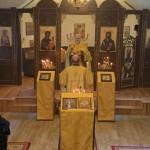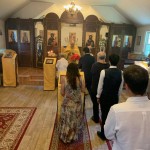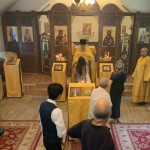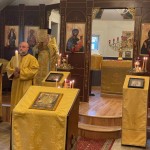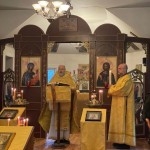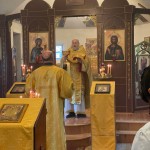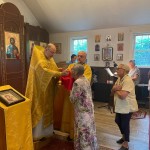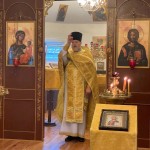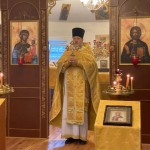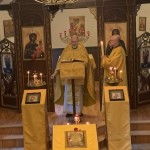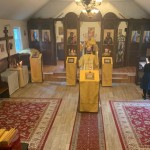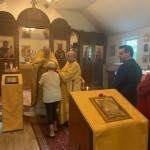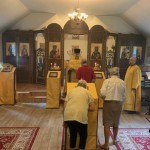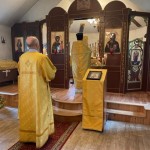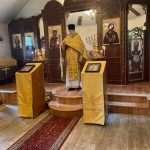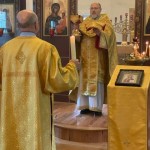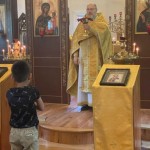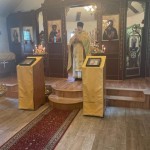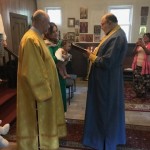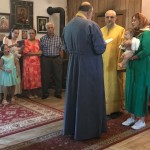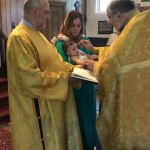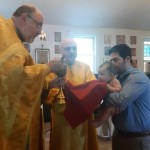On July 23, on the 7th Sunday after Pentecost, feast of Venerable Anthony of the Caves, St. George parish family gathered for a nice celebration. The Divine Liturgy in our temple was celebrated by our Rector, Archpriest Igor Tarasov. After the reading from the Holy Gospel he addressed the faithful with the following homily:
“Dear brothers and sisters in Christ! This Sunday again the reading from the Holy Gospel is telling us about the healings performed by our Lord Jesus Christ. He returned the sight to the blind and he healed the mute. The blind men followed Him crying out and saying, “Son of David, have mercy on us!” (Mt. 9, 27). Let us remember today who was David. He was the King of Judea blessed by God; he was one of the ancestors of Jesus Christ”.
“The Old Testament Scripture tells us a lot about holy king David. Since childhood days many of us were probably thrilled to the story of David defeating Goliath. The Philistine giant, Goliath was feared by the Jews who fought the Philistines. And he dared them to choose a warrior to fight him, cursing the Jews and making fun of them. For forty days the Jews could not find anyone willing to meet Goliath in the battle. Finally, a shepherd boy named David undertook that seemingly impossible task. He met and conquered the giant with the simplest of weapons, and with no visible armor”.
“Each of us, in some sense, has a giant to fight. For some of us it is a physical ailment. For some it is a bad habit. For many of us it is fear of the future. For others, it is deep sorrow disturbing our peace. And generally, speaking of our spiritual state, the most fearsome giant is our sinful nature, our passions that threaten our salvation. Day by day we are battling our own giant, and we may ask, what are our chances to defeat it?”
“Let us recall that the match between David and Goliath seemed to be a hopeless encounter. David was not trained as a warrior. But in answer to Goliath’s cursing and taunting, he replied: “You come to me with a sword… But I come to you in the name of the Lord of hosts” (1 Sam. 17, 45). This was the secret of this battle. And as we fight our giants, this must be the secret – the battle is the Lord’s and our main weapon is God’s strength”.
“As we read the Scripture, we see others facing giants. We may recall that the Jews led by Moses from Egypt finally reached the borders of the promised land. And they sent the spies to investigate that land. After weeks of observation those spies returned full of terrifying impressions. They said, “There we saw the giants… and we were in our own sight as grasshoppers, and so we were in their sight” (Num. 13, 34). After hearing this report most of the Jews became very afraid to cross the border but two of those spies, Joshua and Caleb told them to have faith in God because the people of Canaan, even if they are so great and fearsome, they have no power against God who is with His people”.
“Let us not forget that our Lord Jesus Himself was facing His own giant of persecution and crucifixion. Inspiring the Apostles He said, “In the world you have tribulation; but be of good cheer, I have overcome the world” (Jn. 16, 33). And He went forth to conquer the mightiest giant of all – death.
“The two blind men in today’s Gospel lesson faced the giant of physical blindness. But they came to Someone Who was the real Giant. In the power of their faith in Him the giant of blindness was overcome. “According to your faith be it done to you,” Jesus said to them (Mt. 9, 29)”.
“Today we commemorate Venerable Father Anthony of the Kiev Caves. He was also facing a giant of his own. If we read his life story we may be convinced of that. St. Anthony faced temptations and a lot of difficulties in his ascetic warfare. But he trusted in God and saw his goal of ascetic life. So he conquered all these obstacles”.
“Dear brothers and sisters! When like David, like Joshua and Caleb, like the two blind men, like Venerable Anthony of the Caves, we look at life with faith in the Lord, the giants become cut down in size. We no longer grovel before them. For we are not grasshoppers in the presence of overpowering giants, but sons and daughters of Almighty God, clothed in the armor of Christ, trusting in Him. Being created in God’s image, we ourselves are supposed to be not grasshoppers but giants. If we invite Him to come and live within us, then there is a real giant in each one of us.”
The choir prayerfully performed the hymns dedicated to Venerable Anthony of the Caves whose memory was celebrated on that day.
After the dismissal of the Liturgy the Rector made some announcements.

